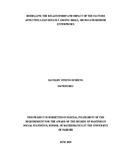| dc.description.abstract | Small businesses have been cited as major players in economic development in Kenya.
As is the case in other developing countries, securing financing and loan repayments
remains a challenge in this group of enterprises.
This research analysed loan repayment and credit management of Small, Micro and
Medium Enterprises in a Kenyan financial institution. Several factors were analysed to
determine their relationship and impact on default. These factors included age, period and
type of relationship of the customer with the bank (personal, business, old or new to bank
customers), loan amount, loan term, loanproduct, gender, repayment amount, other
borrowing, net income, marital status, interest rate and level of education. The response
variable which is default can either take a “yes” or a “no” which is binary nature. The
binary Logit model was therefore used to assess the relationship and impact of the
determinant factors affecting loan repayment.
The study analysed 1000 loans granted to small business owners by a Kenyan
commercial bank. Net income, loan repayment period, interest rate and repayment
amount were found to be stiatically significant and were the major factors that influenced
default. | en_US |

